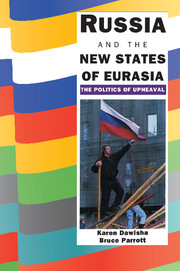Book contents
- Frontmatter
- Contents
- Preface
- Maps
- Introduction
- 1 The Legacies of History
- 2 National Identity and Ethnicity
- 3 The Impact of Religion
- 4 Political Culture and Civil Society
- 5 The Impact of Economics
- 6 Foreign Policy Priorities and Institutions
- 7 Military Issues
- 8 The Nuclear Factor
- Conclusion
- Appendix A Chronology of Events, January 1992 to October 1993
- Appendix B Compendium of Leadership and Institutional Changes in the Eurasian States, January 1992 to October 1993
- Appendix C Soviet Census Data, Union Republic and ASSR, 1989
- Notes
- Index
Introduction
Published online by Cambridge University Press: 06 July 2010
- Frontmatter
- Contents
- Preface
- Maps
- Introduction
- 1 The Legacies of History
- 2 National Identity and Ethnicity
- 3 The Impact of Religion
- 4 Political Culture and Civil Society
- 5 The Impact of Economics
- 6 Foreign Policy Priorities and Institutions
- 7 Military Issues
- 8 The Nuclear Factor
- Conclusion
- Appendix A Chronology of Events, January 1992 to October 1993
- Appendix B Compendium of Leadership and Institutional Changes in the Eurasian States, January 1992 to October 1993
- Appendix C Soviet Census Data, Union Republic and ASSR, 1989
- Notes
- Index
Summary
The Soviet Union's disintegration into fifteen states is a development whose vast ramifications may lead future historians to treat it as the most important event of the twentieth century. For the first four or five decades of its existence the USSR was the self-styled exemplar of a noncapitalist form of sociopolitical organization and an inspiration to revolutionary groups in the industrial and underdeveloped worlds. After making a decisive contribution to the defeat of Nazi Germany in World War II, the Soviet Union sought leadership of the anti-Western bloc of socialist and prosocialist countries that emerged from the political tumult and anticolonial movements unleashed by the war. Despite the failure of the USSR's subsequent efforts to shift the global correlation of forces decisively in its favor, its military might and capacity for internal repression helped maintain a harsh but fixed constellation of political alignments among the states of Eurasia and among the peoples of the Soviet Union itself.
The collapse of the Soviet Empire has created historic opportunities and historic dangers. On the one hand, the abandonment of Marxism- Leninism and the democratization of politics within Russia, Ukraine, and other newly independent states of the former USSR have improved the possibility of global cooperation transcending the enmities of the Cold War. On the other hand, acute instability within the new states, and growing tensions among them, have created a serious risk of interstate military clashes and widespread civil war in the heart of Eurasia. Even if such a dire eventuality is avoided, the political implosion of the Soviet system has undermined the international alliances originally designed to counter Soviet expansionism and has created a major risk of sociopolitical instability extending far beyond former Soviet territories into the adjacent countries of Europe, the Middle East, and Asia.
- Type
- Chapter
- Information
- Russia and the New States of EurasiaThe Politics of Upheaval, pp. 1 - 22Publisher: Cambridge University PressPrint publication year: 1994
- 1
- Cited by



